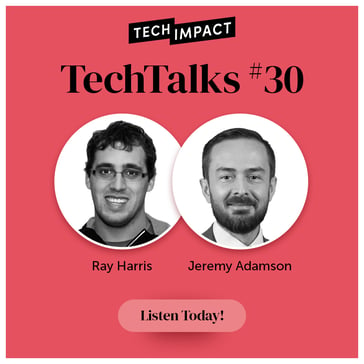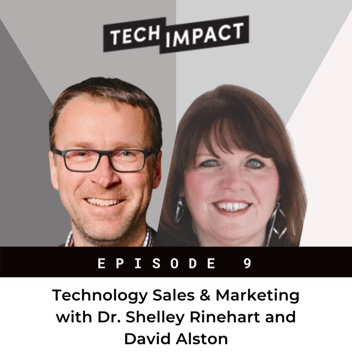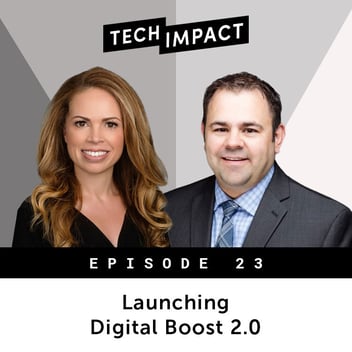EPISODE # 30 Data Career Advice from Veterans
TechImpact

Data is big business, and it’s creating a crop of promising new roles and opportunities here in New Brunswick for those who can analyze and visualize it.
So I was thrilled to host a panel discussion with two leading New Brunswick data strategists at UNB’s annual Data Challenge in November. Ray Harris, the founder of Data Wazo, a data strategy consultancy in Fredericton, and Jeremy Adamson, who teaches strategic analytics management in UNB’s MBA program and is the author of the new book Minding the Machines, sat down to talk about what working in data is like.
It was a terrific hour full of interesting stories and actionable advice, especially for students and job-seekers. Ray and Jeremy shared tips on where to focus your energy, how to demonstrate your talents and how to go about landing your first role.
To kick off the conversation, I asked them about their backstories.
Different Paths to a Career in Data
While Ray and Jeremy’s educations and resumes differ, they both highlight the blend of technical and business skills that got them to where they are today.
Ray’s path started at UNB, in its Faculty of Computer Science’s Information Systems program, which offered both IT and business courses.
“That’s where there's such a big gap,” he says. “I see a lot of people here are starting to fill that gap of both knowing how technology can change the world and how a business can benefit from technology.”
Ray went on to various IT roles in government and the private sector, eventually landing at J.D. Irving Ltd. He loved the work, but the commute between Fredericton and Saint John was untenable.
“What I wanted to do was play with data every single day; that’s my passion,” he says. There weren’t many opportunities in the province at that time that interested him. So, in 2017, he set up his own firm, now called Data Wazo.
“I just said, ‘To heck with it, I'll do it myself,’” Ray says. He started landing small contracts and building his client list, which today includes various companies in Canada, the U.S. and beyond. A typical client has been collecting data but has no idea how to organize and analyze it. Some projects are one-offs; for others, it’s ongoing, with Ray serving as contract chief data officer.
“I love, love, love the diversity of my job because there's data everywhere,” he says. “No matter what your passion is, you can find an opportunity to be in a data field. That's what keeps me going every day: new projects, new opportunities to discover.”
Jeremy was working as a web developer in the early 2000s when the dot-com crash made him question his future with a career in computers. He turned to civil engineering but knew he had to change course after a tedious summer internship. Two classes on applied statistics and traffic engineering pointed towards data analysis.
“I switched gears,” he says. “I worked for a little bit as a transportation engineer, but my favourite part by far was predicting driver behaviour.”
He did a master’s at UNB in collision prediction, then worked in government, where he quickly hit the ceiling. He did an executive MBA at the University of Calgary before taking on various private-sector roles.
“In the end, it all came together: the coding for my web development days, the project management from civil engineering, the stats from the masters and the business from the MBA,” he says. “It took me a heck of a long time to get there. But I certainly have been able to find my niche as a data scientist.”
A Thriving Tech Ecosystem
Before returning to New Brunswick from Alberta, Jeremy posted on LinkedIn that he was moving to Fredericton. “Who should I meet, who should I have coffee with?” he wrote.
More than 50 people reached out.
“We've lived in Toronto, Waterloo, Edmonton, Calgary, we've been around, and nowhere else would you see that level of welcome,” he says. “Fredericton is a really special place.”
Along with the legendary Maritime hospitality, he was struck by the change in tone from the early aughts when it felt like ambitious young people had to leave New Brunswick to start their careers.
“What surprised me with all those coffee chats is everybody is so enthusiastic and optimistic, everybody has ideas, and everybody's pursuing them, so that spirit of defeatism is just completely gone,” he says. “Now it feels like everybody's on the edge of something great.”
Data-Driven Side Projects
While business is increasingly harnessing data to create value, COVID has spurred a huge data awaking in the public, and Ray has emerged as a trusted source to New Brunswickers during the pandemic.
“As soon as our numbers started coming out, I was tracking them. And people were interested, so I started posting it,” he says. 'There are so many people who are seeing data for the very first time because of COVID. So many of us are coming out of this pandemic way more data-literate than we've ever been.”
While Ray’s helping the public better understand the top story of the past two years, Jeremy is advancing ideas around data in a new book that’s getting a lot of buzz. Minding the Machines upends the conventional, tech-first focus on data most companies have. Instead, he says to focus on strategy, process and people.
“Technology, which is usually the foremost consideration, is an afterthought once you have those building blocks in place,” he says. “For practitioners, the hope with this book is it helps them advance in their career by focusing more on value creation.”
Expert Advice to Land a Data Role
In the last part of our conversation, I asked Ray and Jeremy to reflect on what it takes to succeed in the data job hunt. Here are their Top 10 tips:
-
Learn at least one tool within all of the major families. “That's gonna be table stakes wherever you go,” Jeremy says.
-
Work on your soft skills like communications, public speaking, empathy and collaboration. “Learning how to explain neural nets to your grandparents will help you a lot more than learning one more tool,” Jeremy says.
-
Learn about the business. “The more you can start framing data analytics as a business solution and not an IoT delivery item, the better off you're going to be,” Ray says.
-
Reverse engineer. “Understand what the business outcome needs to be and then work backwards to find the simplest possible way to approach that,” Jeremy says.
-
Show your work. Data science and analytics are creative practices, Jeremy says. Let that show in your resume and how you present your experience.
-
Build and leverage your network, including online and especially on LinkedIn. Reach out to hiring managers and stay in touch during your job search.
-
Be proactive. If you’re interested in a company, you think you can help, reach out. “Who could say no to that?” Ray says.
-
Look at the job description, not just the title. “Business analyst” isn’t always a data role.
-
Create a portfolio. As Ray points out, some software, such as Tableau, is free for students. Get busy showing potential employers your chops.
-
Find a mentor. “Perspective only comes with time and with a lot of bruises,” Jeremy says. “If you can find someone who already has those bruises and scars … that's going to accelerate things for you greatly. “
What a fascinating and valuable discussion. I’m so excited about the data job prospects here in New Brunswick and the incredible leadership we have here in seasoned data professionals like Ray and Jeremy.
Check out our entire conversation by clicking here to listen or watch the panel here.
DON’T MISS AN EPISODE.
Do you subscribe to the Tech Talks With Cathy Simpson podcast? If not, please do. Every week, my guests and I will be covering lots of different topics around innovation, technology and the future. Click here to listen and subscribe in iTunes. You'll find us on Spotify, Apple Podcasts, Google Podcasts, PodLink and everywhere else you enjoy podcasts.
And sign up for our newsletter to never miss an update.
Visit Techimpact's website here
.png?width=600&height=187&name=Untitled%20design%20(2).png)


